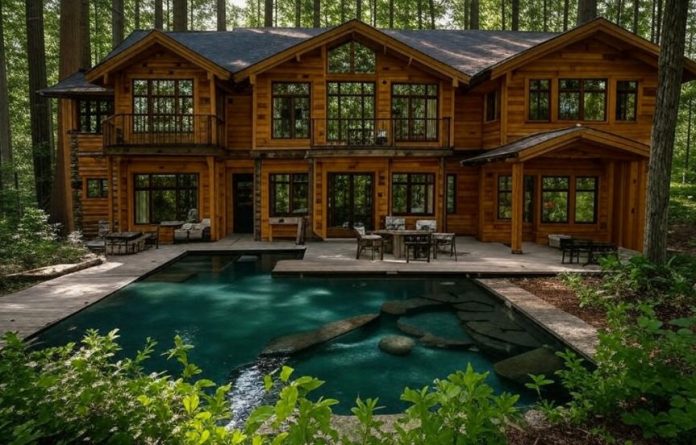Creating an excellent floor plan is essential in building your dream log home. Let’s assume you have decided on the basic structure of your log home, such as cabin style, chalet, ranch, cape cod, or traditional. And we will also assume that you have created your “must-have” and “want if possible” lists of features for your house.
With those things done, the next task is to fit all the pieces of the puzzle together into a floor plan – one that not only meets all your needs but excites you! After all, you’ll live in your log home for many years, so it’s critical to get everything right before the building starts.
In some cases, your floor plan may be completely flexible within an empty shell, constrained only by the outline of the external walls.
If you start with a clean sheet like this, it can be challenging to know where to begin. One helpful technique is to start with your existing house and consider what you like about its layout and what you dislike. What works well, and what have you always wished you could change?
It doesn’t matter if the styles of your old and new house are very different here you should be thinking about things like:
-The absolute or relative sizes of the different rooms.
-In terms of their placement, the focus is on their interrelationship.
-How the daily traffic flows between rooms and around the house.
In most cases, finding the perfect floor plan is achieved by taking some form of pre-designed layout and adapting it to suit you more precisely. Just how much you can modify the plan will vary from supplier to supplier and log home design to log home design. So, the first thing to establish is exactly how much flexibility you have.
In an ideal setting, only a few things are immovable or unchangeable in your log home. Nevertheless, additional factors could prevent you from obtaining your desired specific arrangement.
The most common obstacles are cost (it may be prohibitively expensive to do what you want) and officialdom ( The layout you envision may not comply with the regulations set by the building code). So, getting your rough design checked before you get too attached to it is always a good idea! Let’s consider some factors when arriving at your perfect floor plan.
Room Sizes
Most off-the-shelf plans allow you to move internal walls around to change the proportions of different rooms. But you have to be sure that each of the resulting rooms is adequate for its purpose. Use the dimensions of your current rooms to help you get an accurate feel for what the dimensions on the plan mean.
How Many Rooms
One area where your new log home will likely differ from your current home is that most log and timber frame homes have more open spaces, combining most public rooms into one ample space. Think carefully about how this will apply to your lifestyle.
Use All Three Dimensions
While a few log homes are only a single story, most are at least one and a half stories, and you may also have a basement to include in your planning.
It means you have to consider not only the layout of each floor but also how these floors relate to each other vertically. For example, keeping water supply and waste drainage on one side of the building is the most cost-effective. Your log home builder can be of great help here.
Storage
Including ample storage spaces in home designs is crucial, especially for holiday homes. Be realistic about how much storage space you need, again using your existing home as a starting point.
Extra Spaces
Designing a log home gives you the chance to include some different forms of space that add little to the cost of the house but can significantly enhance the flexibility of the design. The first space you might plan is a loft that can be used as an extra living room, a guest room, or an office — or, with some planning, perhaps all three.
The other space to include in your planning is a porch or deck (or both). If you plan the location of patios and decks carefully and integrate them into the internal floor plan, they can add lots of value and enjoyment.
While you may be satisfied with sketching your plans out roughly before handing them over to the professionals, you may find it helpful to look at some of the low-cost packages for home computers. These can be very powerful and allow you to modify your floor plan often. Most will even give you a three-dimensional view of your new home design.
Home design software enables you to hand over a very accurate representation of your vision to the architect or designer to ensure the finished building is just what you planned. Another place to find great floor plans is to search the internet. Many floor plan websites offer thousands of programs. They can give you some great ideas.
And, of course, the most straightforward way to come up with a great floor plan is to ask your builder to come up with one for you. They will gladly take your input on your desired home features and create a design that will meet your needs. Remember, with some thought and planning, you can easily create your perfect log home floor plan.

